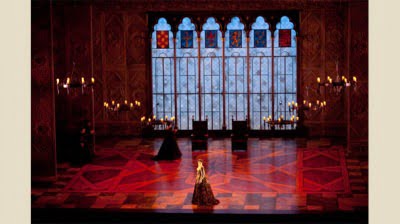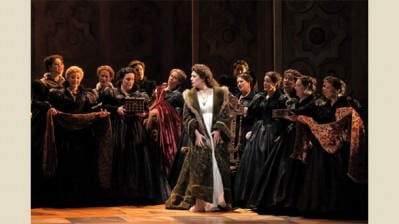Ernani
by Giuseppe Verdi

at Lyric Opera of Chicago
20 N. Wacker
www.lyricopera.org/
Through November 23, 2009
Visually Memorable, Big Choruses
Great success came to Verdi as a result of his opera Ernani, which is now back in production at the Lyric Opera. This was his first big hit, leading on to classics such as Rigoletto and La Traviata. Indeed, even the least initiated knows “La donna è mobile,” albeit probably from cartoons. Such greatness and fame came, unfortunately, after Ernani, yet also as a result of it; this opera is clearly the work of a talented composer but one who is as yet still too inexperienced to find the right music to fit the melodrama of the libretto.

Ernani was based on a play by Victor Hugo, which was historically situated around the reign of Charles V in the 16th century. The central conflict engulfs the title character and his love, Elvira, in a veritable love rhombus with a nobleman and the king. Because of the era, elements such as honor and duty mix with the desire for love and power to create a volatile mix that is on the brink of disaster when it suddenly resolves with the happy marriage of Ernani and Elvira. Then, however, there is the final and fatal fourth act where a forgotten oath spoils the wedding party.
Musically and dramatically, Verdi fails to tell a coherent story. He steals from the previous generation of composers, notably Donizetti, to write light dances and marches to accompany both joy and despair. For instance, in the final act, to accompany the trio “Ferma, crudele, estinguere” (“Strong, Cruel, Extinguish”), containing the line “Because of your love, he must die,” Verdi writes a jaunty, up-beat waltz.
With such a flawed jewel, however, the Lyric does wonders to make it shine. The large voices of the stars are matched by the towering sets and vibrant costumes. As Ernani, Salvatore Licitra brings strength and arrogance to the role of outcast bandit but somehow fails to exude sufficient charisma. Sondra Radvanovsky, playing his lover, Elvira, revels in the role’s coloratura passages but can also breathe life into a lyrical line. As Don Carlo, the king who becomes emperor, Boaz Daniel had the most difficult role, for we see his character in three vastly different lights between which there is no connective material. His voice balanced the power and grace required for his role, but, visually, I had a hard time recognizing the different stages of his development. While each singer thrived on their own, several of the duets seemed awkward, like couples dancing at a high school dance. In some cases, the singers seemed a little hesitant, while in others, their voices just seemed unwilling to blend.
The conductor was Italian Renato Palumbo, who had his hands full keeping the singers together with the orchestra. Each sounded impeccable on its own, but I noticed several instances of tempo disagreement—something that I have only noticed once in the two operas so far conducted by Sir Andrew Davis. Perhaps because of this, it seemed like the singers were, at times, blatantly keeping their eyes on the conductor, which made it feel more like a concert than a staged production. I also felt that the orchestra was slightly out of balance with itself. After having listened to some recordings online, I heard the violins for what seemed like the first time. It may have just been my seat, but the orchestra seemed more rich in the brass section than in the strings. While it seemed a bit rough around the edges, it is something that will hopefully fade as Mr. Palumbo settles in.
Overall, the opera was not as sophisticated as Verdi would write—or even as what we have seen so far this year at the Lyric—but it is still somewhat weightier than what came before. Faust and Tosca are clearly masterpieces, but Ernani seems to be debatable. In contrast to those, however, the mood of Ernani is relatively light, almost cheerful, continually flirting with tragedy and comedy until the final suicide. While, in the program notes, Ms. Rodvanovsky opines that Ernani should be as well known as other classic Verdi operas, I respectfully disagree and feel that the relative scarcity of performances is well deserved.
Somewhat Recommended
Evan Kuchar
Editor’s Note:
While I’m still learning to appreciate opera, I did find much to enjoy in Ernani. The scope, the spectacle, the sets and customs were spectacular. Verdi’s music was episodic, moving from subtle to a triumphant powerful endings to many arias. The anthems and marches were enlightening and thrilling.
I especially enjoyed the rich vocals from Sondra Radanovsky’s Elvira, Salvatore Licitra’s Ernaani and Giacomo Presta’s Silva and the fine chorus singing. This is a fine production of a rare opera.
Recommended
Tom Williams
